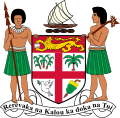Parliament of Fiji
| Parliament of Fiji | |
|---|---|
| Unicameral | |
 |
|
| Leadership | |
|
President
|
|
|
Prime Minister
|
|
|
Speaker
|
|
|
Attorney-General
|
|
| Structure | |
| Seats | 50 members |
 |
|
|
Political groups
|
Government FijiFirst (32) Opposition SDLP (15) Crossbench NFP (3) |
| Meeting place | |
 |
|
| Government Buildings, Suva | |
| Website | |
| www |
|
The Parliament of Fiji is the unicameral legislature of the Republic of the Fiji. It consists of 50 members elected every 4 years using open-list proportional representation in one multi-member nationwide constituency.
The Fijian Parliament dates from 10 October 1970, when Fiji became independent from the United Kingdom. The Parliament replaced the former colonial legislative body, the Legislative Council, which had existed in various forms throughout the entire colonial period. A grandfather clause in the 1970 Constitution, which was adopted on independence, provided for the old Legislative Council to be renamed as the House of Representatives and remain in office, pending the first post-independence elections in 1972.
Since independence, Parliamentary rule has been interrupted three times. The first interruption was from 1987 through 1992, owing to two coups d'état in 1987 instigated by Lieutenant Colonel Sitiveni Rabuka. The second interruption occurred when a coup in 2002 attempted by George Speight rendered the parliamentary system unworkable and resulted in Parliament's dissolution. A general election in 2001 restored the democratic system. The Republic of Fiji Military Forces overthrew the government again in 2006. No further elections would be held until the September 2014 election.
The composition of Parliament has changed over the years. From 1972 to 1987, there were 52 Representatives and 22 Senators. In 1992, Parliament was enlarged to 70 Representatives and 34 Senators, figures marginally adjusted in 1999 to provide for 71 Representatives and 32 Senators. 25 of these were elected by universal suffrage. The remaining 46 were reserved for Fiji's ethnic communities and were elected from communal electoral rolls: 23 Fijians, 19 Indo-Fijians, 1 Rotuman, and 3 "General electors" (Europeans, Chinese, and other minorities). The upper chamber of the parliament, the Senate, had 32 members, formally appointed by the President on the nomination of the Great Council of Chiefs (14), the Prime Minister (9), the Leader of the Opposition (8), and the Rotuman Islands Council (1).
...
Wikipedia
